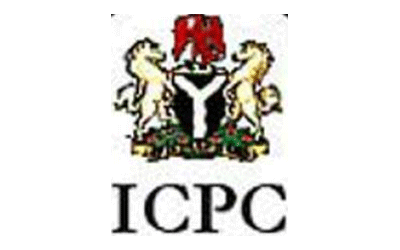 |
| ICPC building |
Following the result of its survey that showed N9.4bn bribes exchanged hands in the judicial sector between 2018 and 2020, the Independent Corrupt Practices and other related Offences Commission has given reasons why it may not be able to prosecute those involved.
A senior research fellow at the Anti-Corruption Academy of Nigeria, an arm of the ICPC, Dr Elijah Okebukola, explained on a programme on 99.3 Nigeria Info in Lagos few days ago that the survey did not obtain evidence that could be used to prosecute anyone, as respondents were assured they would be anonymous.
He stressed that the essence of the survey was to gather data and information that could enable the ICPC to effectively combat the corruption in the country.
There have been concerns over the rising incidence of corruption in the judiciary, especially with its denotation as the last hope of the common man and the way outcomes of court processes determine people’s right to life and liberty.
The ICPC had in an 84-page survey titled, ‘Nigeria Corruption Index: Report of a pilot survey 2020,’ revealed its findings about the level of corruption in the justice sector, executive and legislative arms of government, including ministries, departments and agencies.
“The total amount of money reported by the justice sector respondents as corruptly demanded, offered and paid between 2018 and 2020 was N9,457,650,000.00,” the report noted.
However, when asked what would happen to the respondents who admitted to have witnessed or partook in the bribery, Okebukola said, “We need the survey to get knowledge and data, so we may not be able to get the kind of evidence that can be used for prosecution.
“Every survey of this kind that gives you this kind of information and data does not give you the kind of data and information that you can use to prosecute anybody, so you cannot go to court and say you asked a number of lawyers their experience with bribery in the justice sector. That’s not the kind of evidence you want to approach the court with.
“That does not mean prosecution is not important, it is very important and nobody is above the law. But this kind of data certainly cannot lead to the prosecution of anybody; it can guide prosecutors in exercising their prosecutorial interventions. So, it wasn’t aimed at getting evidence to prosecute.
“If it was aimed at that, it would be unethical. When you ask respondents to share their experience with you, you are not investigating them, and it is on that basis that they would even agree to share their experiences with you. If you ask them with a view to prosecuting them, nobody would share their experiences with you.
“Also, they are supposed to be anonymous, and with that array of anonymity, you cannot prosecute anyone.”
He however explained that the survey serves as a basis for other interventions, like exposing what is going on in different sectors and how it can be dealt with.
He added, “It helps to know what we are dealing with and how to deal with it. That brings us to the point that in anti-corruption, prosecution is not necessarily its most effective tool. Prevention is actually the most important tool to fight corruption. When you know who is doing what and how they are doing it, policymakers, those who implement the policies, anti-corruption agencies, law enforcement agencies, CSOs and the media would know what steps to take.”
Okebukola noted that the survey focused on the respondents’ experiences and not perception.
He pointed out that all the respondents agreed that the independence of the judiciary is necessary in the fight against corruption, and that when asked about the practices that erode the independence of the judiciary, the majority said non-compliance with court orders, which, according to them, reduces the effectiveness in fighting corruption.
Okebukola added, “We asked further those who, from their own experience, refuse to obey court orders, a vast majority said private citizens, including private commercial companies, are at the fore in refusing to obey court orders, followed by law enforcement agents, MDAs.”
When asked those that were most responsible for initiating bribe for judgement, he noted that the respondents said lawyers were more responsible for going out to seek bribe for judgement, followed by the litigants, court officials and the judges, etc. “The initial assumption was that judges were at the fore, but it turned out that lawyers are at the fore,” he added.
In this article:
